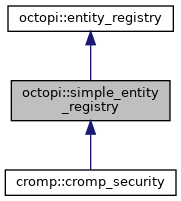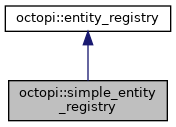Provides a basic implementation of an entity_registry for octopus. More...
#include <simple_entity_registry.h>


Public Member Functions | |
| simple_entity_registry () | |
| virtual | ~simple_entity_registry () |
| virtual bool | authorized (const octopus_entity &entity) |
| returns true if the "entity" is a registered and authorized entity. More... | |
| virtual bool | locate_entity (const octopus_entity &entity, timely::time_stamp &last_active, basis::byte_array &verification) |
| retrieves the "security_record" for the "entity" if it exists. More... | |
| virtual bool | add_entity (const octopus_entity &entity, const basis::byte_array &verification) |
| adds the "entity" to the list of authorized users. More... | |
| virtual bool | refresh_entity (const octopus_entity &entity) |
| this should be used to refresh the entity's health record. More... | |
| virtual bool | zap_entity (const octopus_entity &entity) |
| removes an "entity" if the entity can be found. More... | |
| virtual basis::astring | text_form () |
| shows the contents of the registry. More... | |
 Public Member Functions inherited from octopi::entity_registry Public Member Functions inherited from octopi::entity_registry | |
| entity_registry () | |
| virtual | ~entity_registry () |
Detailed Description
Provides a basic implementation of an entity_registry for octopus.
Requests to add an entity are always permitted; the registration is a formality that allows us to establish a record for the entity. This base class just implements authorized() by invoking locate_entity() to check if the entity exists. Thus, using it as a security model really just requires calling add_entity() whenever a new entity is seen. A different security model can be implemented in a derived class by over- riding the authorized() method and making it perform an application- specific security check.
Definition at line 39 of file simple_entity_registry.h.
Constructor & Destructor Documentation
◆ simple_entity_registry()
| octopi::simple_entity_registry::simple_entity_registry | ( | ) |
Definition at line 62 of file simple_entity_registry.cpp.
◆ ~simple_entity_registry()
|
virtual |
Definition at line 68 of file simple_entity_registry.cpp.
References basis::WHACK().
Member Function Documentation
◆ add_entity()
|
virtual |
adds the "entity" to the list of authorized users.
note that this will still succeed if the entity is already present, allowing it to serve as an entity refresh method. if the "verification" has any length, it will be stored in the record for the "entity".
Implements octopi::entity_registry.
Reimplemented in cromp::cromp_security.
Definition at line 91 of file simple_entity_registry.cpp.
References GRAB_LOCK, basis::array< contents >::length(), and octopi::octopus_entity::mangled_form().
◆ authorized()
|
virtual |
returns true if the "entity" is a registered and authorized entity.
Implements octopi::entity_registry.
Definition at line 74 of file simple_entity_registry.cpp.
References GRAB_LOCK, and octopi::octopus_entity::mangled_form().
◆ locate_entity()
|
virtual |
retrieves the "security_record" for the "entity" if it exists.
true is returned on success.
Implements octopi::entity_registry.
Definition at line 119 of file simple_entity_registry.cpp.
References GRAB_LOCK, and octopi::octopus_entity::mangled_form().
◆ refresh_entity()
|
virtual |
this should be used to refresh the entity's health record.
it indicates that this entity is still functioning and should not be removed due to inactivity.
Implements octopi::entity_registry.
Definition at line 81 of file simple_entity_registry.cpp.
References GRAB_LOCK, and octopi::octopus_entity::mangled_form().
◆ text_form()
|
virtual |
shows the contents of the registry.
Implements octopi::entity_registry.
Definition at line 140 of file simple_entity_registry.cpp.
References GRAB_LOCK, and octopi::text_form_applier().
◆ zap_entity()
|
virtual |
removes an "entity" if the entity can be found.
true is returned if that "entity" existed.
Implements octopi::entity_registry.
Definition at line 113 of file simple_entity_registry.cpp.
References GRAB_LOCK, and octopi::octopus_entity::mangled_form().
The documentation for this class was generated from the following files:
- /opt/feistymeow.org/feisty_meow/octopi/library/tentacles/simple_entity_registry.h
- /opt/feistymeow.org/feisty_meow/octopi/library/tentacles/simple_entity_registry.cpp